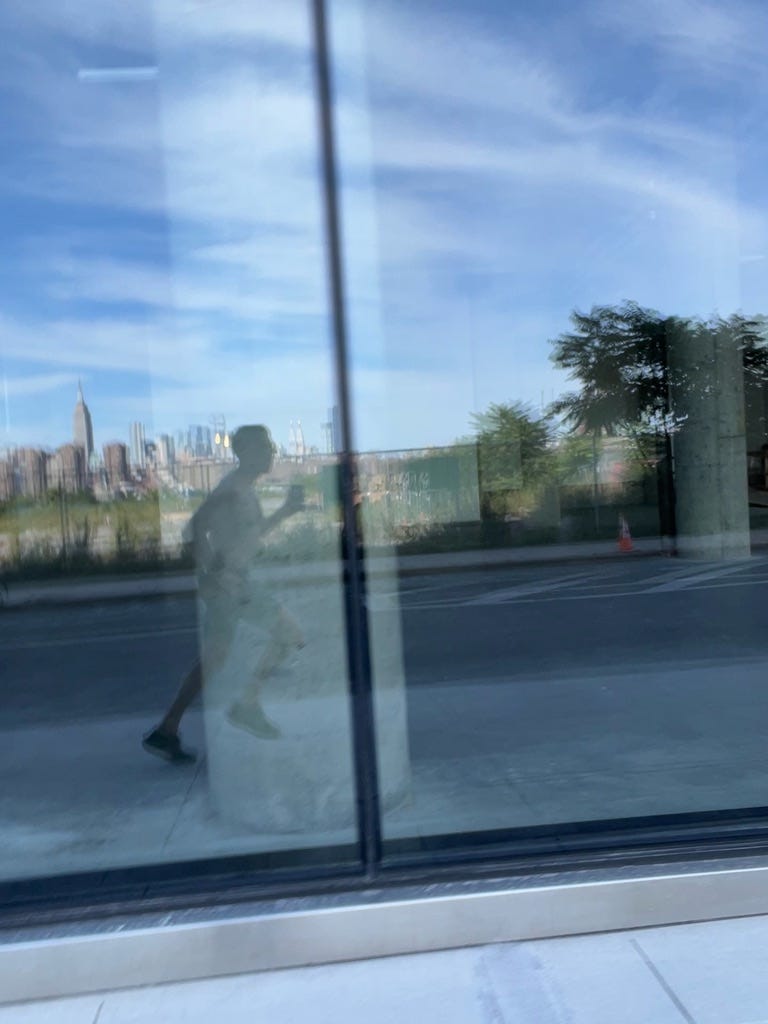Running
This is Western Coffee—notes on building the creative body. Last time: The desert. The whole series is here. Please share this email; you can sign up free below.
Sometimes I feel the same way about running that I do about living in New York City: I’ve intruded onto something that wasn’t meant for me, something so rare and glorious that, having not been born into its privilege, I can experience it only as a trespasser. Yet of course these modes of being, running and the city, are not only unpatrolled but actually wide open. The nature of the exclusion they do hold is that their difficulty accumulates. You can move to New York in a flash, but then you have to pay the rent, and keep paying it; you can start a run almost anywhere, anytime, but perils line your way in the absence of adequate foresight—overtaxing a muscle, running out of water, leaving too soon before dark.
In either case, it’s the balance between challenge and reward that determines how long someone will stay engaged; when they’ll need a break, and for how long, and if and when they’ll return. Some are fated to find greater pleasures elsewhere. Others hear, their whole life, the call of it, fainter and then louder, and this is what happened to me: I’d made my home in Los Angeles when New York reminded me that it still held an older and more urgent claim. I spent years believing that injury had blocked me from running before I recognized, with no fanfare, that that belief was dead.
One of the hardest things to teach a machine to do is move like a human:
In 1988, the roboticist Hans Moravec observed, in what has become known as Moravec’s paradox, that tasks we find difficult are child’s play for a computer, and vice-versa: “It is comparatively easy to make computers exhibit adult-level performance in solving problems on intelligence tests or playing checkers, and difficult or impossible to give them the skills of a one-year-old when it comes to perception and mobility.”
Running offers a potent opening for presence in the body exactly because it requires so much precise coordination, and though most of this is happening in the background—think too much about your form and you might actually degrade it—it’s a useful illustration of what things that happen in the background actually require. In the background doesn’t mean no effort, obviously; it just means the effort is harder to account for, an indeterminate liability, like a charger still drawing current when it’s not connected to your phone. Some part of wisdom lies in learning where your silent dynamos of effort lie and going after them with all the love and care you can muster, a superfluity of care. Like a parent—anybody’s—who packed up the leftovers and won’t let you refuse them.
Athletics and creativity are linked for me in part because I believe they perform this kind of care for each other. I never spend 66 lengths deep in thought about my novel characters, but the time is at their disposal. They will often have used it, in the background, to prepare, so that when we sit down again together there’s something for us other than silence.
Running leaves nothing in you untouched, not the biggest or the smallest parts. I’ve found it to be the truest medical imaging. Grief has revealed itself to me at a high pace on the Williamsburg Bridge, a deep ache in my leg which needed my notice to, finally, leave. These sorts of excavations are part of the reason, I think, that running has such a reputation for pain and difficulty; because when a confrontation with yourself is due, the running punishes any delay. Worse, it asks you to expunge even those weaknesses you may have come to rely on.
Joseph Smith, my exuberant and problematic antecedent and current creative subject, wrote: “Men are, that they might have joy.” This spiritual teaching finds ratification, of course, in other credible sources. I think one of the great mistakes of our day is in the theory variously expressed that running is somehow insidious, that it speeds our decay—it’s “hard on the joints,” and so on. What it does do is hold up the fact of our congestions, and accuse them. In the wake of a thoughtful runner, you can make out the fumes of sadness, the exhalations of loss. It’s a purgative flame whose heat lifts the legs and fires the heart and casts the eyes to the horizon, where the destinations that demand us thinly hide.
Coming Friday: Resurrection.
Kindly send me your thoughts, questions, and provocations: dmichaelowen@gmail.com. And say hi on Instagram, or let’s Peloton together: @leggy_blond.

